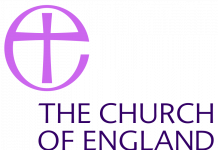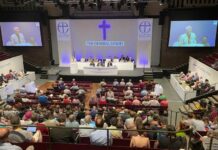Whenever we meet a new person we size them up. We look at their clothing, we hear how they speak, we assess their gender, age, ethnic heritage, and the countless other ways we distinguish different people. It’s automatic – we do it without thinking.
We are very good at it. Our supercomputer of a brain takes milliseconds to determine; is this person friend or foe, supporter or rival, a member of our tribe or a danger to be avoided or overcome. We are the product of millennia of evolutionary development which has allowed our species to survive and now dominate all others (for good and ill).
But as Christians, we have more to say. We are not merely victims of blind evolution, unable to control our impulses. We are the beloved children of a loving God, whose embrace stretches to include the entire world. We are followers of the Christ who transcended boundaries – who spoke with women of dubious reputation, who touched those deemed unclean and diseased, and who dared to suggest that a Samaritan, of all people, was the neighbour.
We also recognise that created order is far from perfect. We live in a fallen world. The stain of sin lies within the hearts of all people, with the potential to corrupt relationships between individuals and groups. We take the wondrous diversity of our planet and denigrate difference in order to make ourselves and our group feel superior. We require God’s forgiveness offered through Christ and his Spirit to direct and guide us towards holiness.
For a devout first century Jew, the two greatest divisions in humanity were probably the one between Jew and Gentile; God’s chosen people and the rest – and between men and woman. And yet, Saint Paul – whose background as a conservative faithful Jew was unquestionable, wrote in his letter to the Galatians:
“There is no longer Jew or Greek, there is no longer slave or free, there is no longer male and female; for all of you are one in Christ Jesus.” (Galatians 3.11)
The old divisions are overcome and a new united humanity is formed through fellowship with Christ Jesus. St Paul’s way of thinking about humanity changed radically after encountering the Risen Lord.
In his letter to the Romans, St Paul spends eleven chapters expounding the glorious gospel of Christ. Then at the start of Chapter 12, as a consequence of the amazing things God has done for us, he appeals to his fellows Christians to “be transformed by the renewing of your minds” (Romans 12.2). Following his own experience, St Paul urges us to change our way of thinking in the light of God’s gift of salvation
Unconscious Bias training is one way we can seek to renew our minds in order to be faithful to the command of scripture. It aims to make us more aware of involuntary assessments and judgements we make on encountering people. It encourages us to slow down our thinking and so avoid automatically jumping to conclusions. It provides some tools, and encourages space, to mould our thinking according to the values of the gospel.
It can also strengthen our church communities. In his first letter to the Corinthians, St Paul paints his famous picture of the church as human body where each part is equally important performing a unique and vital role. This is not simply an ideal, but as St Paul understood it, is an absolute necessity for a functioning healthy body:
“If all were a single member, where would the body be?” (1 Corinthians 12. 19-20).
The more diverse the range of voices and perspectives we can hear, and the wider the range of gifts and talents we can encourage, the stronger and healthier our churches will be.
The training offered by the Diocese introduces some concepts to help us in the renewal our minds and build up our churches. It considers affinity bias – our tendency to gravitate towards people similar to ourselves. It discusses confirmation bias – the way in which we value information which supports our current views and ignore information which may mean we may have to change our mind.
It encourages us to move beyond seeing the world in terms of in-groups and out-groups where positive characteristics are associated within our grouping and negative attributes are assigned to those who appear different. It presents some techniques to help us overcome those unconscious biases which influence our decision making.
The first training session will take place at 7pm on the 27th October and is initially offered as a 2-hour interactive online workshop, for clergy, wardens, PCC members and others. It will be rolled out over the coming year.
If you would like to reserve a space on this session, please click here to book or you can contact Lisa pa.archmanchester@manchester.anglican.org for more information.










